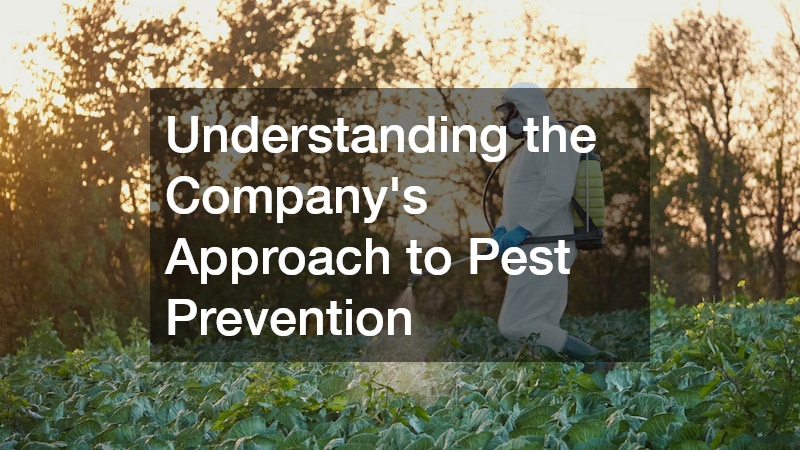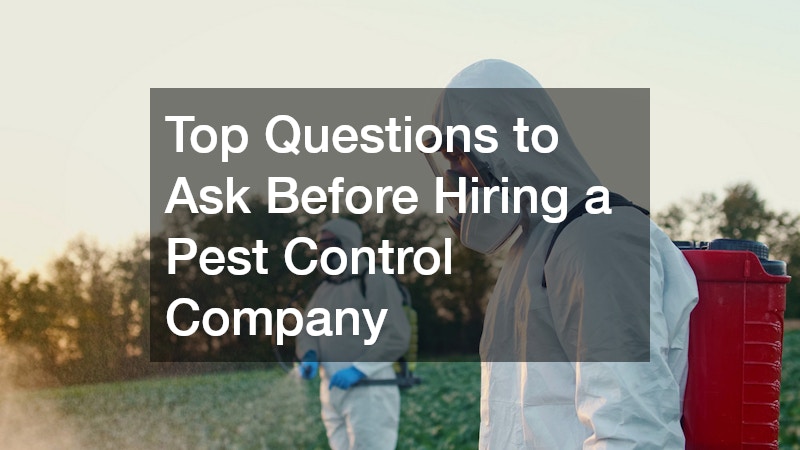Choosing the right pest control company is crucial for ensuring a safe and pest-free home. With numerous options available, it’s essential to know what questions to ask to make an informed decision. This article provides a comprehensive guide on the top questions to consider when hiring a pest control service.
Understanding Certification and Licensing
Before hiring a pest control company, it’s essential to verify the company’s certifications and licensing. This ensures they’re authorized to operate within your region and are qualified to handle potentially dangerous pesticides safely. A licensed company reflects adherence to industry standards and regulations, thereby guaranteeing reliability and trustworthiness.
Checking the certification allows you to filter out companies that might employ unsafe or illegal practices. While some regions have stringent licensing requirements, others may not. Therefore, it is imperative to understand the specific credentials needed in your locality.
Evaluating Experience in Pest Control
The longevity of a pest control company in the market often signifies their dedication and proficiency. A company with years of experience tends to have addressed a wide variety of pest issues, making them adept at handling unique challenges. Experience also means they’ve likely encountered and resolved issues similar to yours, ensuring effectiveness.
Reading past customer testimonials and reviews can offer insights into their service quality and customer satisfaction levels. Additionally, companies with solid reputations often showcase case studies demonstrating their problem-solving capabilities. A well-documented history of successful treatments speaks volumes about their reliability.
Assessing Technician Training and Expertise
The expertise of the technicians handling pest control in your home is critical. Inquire about the company’s training programs to ascertain the skill levels and up-to-date knowledge of their staff. A company committed to regular training will use the latest techniques for pest eradication effectively.
Technicians should be well-versed in identifying and applying the right treatments for various pest infestations. This involves understanding the biology of pests and mastering both chemical and non-chemical treatment options. Proper training also equips them with the skills to handle unexpected challenges during pest control procedures.
Inquiring About Chemical and Non-Chemical Alternatives
A responsible pest control company should offer a variety of products and methods, catering to different needs and concerns. Ensure that the company discloses whether they use chemical, non-chemical, or eco-friendly pest control options. This information is crucial for those conscious about minimizing the environmental impact and health risks associated with pest control.
Non-chemical alternatives can include traps, barriers, or natural repellents designed to deter pests without introducing toxins into your home. For households with children and pets, opting for less harmful options is often advisable. However, these methods might not be as effective against severe infestations where chemical treatments become necessary.
Clarifying Safety Protocols
Attention to safety during pest control treatments is non-negotiable. The company should have clear protocols to protect your family, pets, and the environment. These protocols are especially necessary when handling hazardous chemicals that could pose health risks if misapplied.
Inquire about the company’s procedures for minimizing exposure to residents and pets during treatments. Effective communication about when it’s safe to re-enter your home post-treatment is crucial. Companies should also handle chemical waste disposal responsibly, adhering to environmental safety standards.
Understanding the Company’s Approach to Pest Prevention
An effective pest control service goes beyond treatment and focuses on prevention. Discuss with the company how they plan to prevent future infestations after initial treatment. Understanding their approach to pest prevention can help ensure long-term protection for your home.
Companies should offer advice on how to make your environment less conducive to pests, such as sealing entry points and removing attractants. This proactive approach should be a natural extension of any pest control service agreement. Discovering their commitment to ongoing prevention strategies establishes their dedication to complete pest management.
Exploring Contract Options and Service Agreements
Examining the service agreement is a crucial step when hiring a pest control company. Contracts can range from one-time treatments to more extensive maintenance plans. Understanding what’s covered under each option helps you choose a plan aligned with your needs and budget.
Some contracts might outline specific pests covered, frequency of visits, and emergency call-out procedures. A comprehensive agreement should clarify all aspects of the service provided to avoid misunderstandings later. It’s important to be aware of termination terms and any conditions that might affect the agreement’s validity.
Evaluating the Company’s Guarantee and Follow-up Services
An essential factor in selecting a pest control company is the warranty or guarantee they offer. A confidence-inspiring guarantee will typically include conditions under which the company will return without additional charge if pests reappear. Such commitments indicate the company’s faith in their methods and solutions.
By asking the right questions, you can ensure you hire a competent and reliable pest control company that meets your needs and budget. Tailor these inquiries to align with your specific concerns, and don’t hesitate to seek clarification on any point before making your final decision. A well-informed choice will help maintain a safe, pest-free home and provide peace of mind in the long term.


